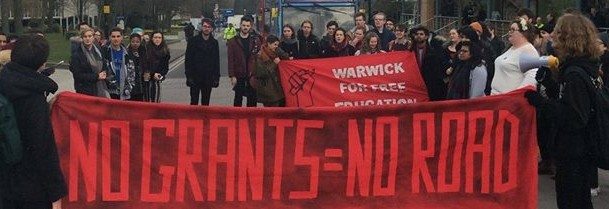Reader’s response: WFFE does more harm than good
In his recent Boar article on the campaigning group Warwick For Free Education (WFFE), Tristan Byrne argues that while WFFE is an, “excellent example of student activism”, our recent intervention against a far-right candidate in the SU’s autumn elections was damaging.
First, WFFE’s intervention had no such aim. It was a democratic intervention designed to raise students’ awareness of the extreme views of the candidate, Jack Hadfield. Representative democracy can only function when voters know the political views of candidates standing for office.
Hadfield’s manifesto had no indication of his record, which includes body shaming feminist activists, sharing quasi-fascist memes on Facebook, and ‘liking’ posts about refugee children being beaten by mobs.
Tristan Byrne argues that our recent intervention against a far-right candidate in the SU’s autumn elections was damaging.
Second, Byrne’s article describes WFFE as “voyeuristic”, for going through Hadfield’s Facebook posts. In fact, concerned students sent us screenshots of these posts – and the far-right pages Hadfield had ‘liked’ – after our initial article. If elected, Hadfield would have had some control over how much funding liberation societies like Anti-Racism and Anti-Sexism would receive from the SU.
The article ends by calling on WFFE to “focus on furthering their anti-austerity cause, rather than publicly shaming right wing students”. I’d like to make the point that we don’t make a habit out of publicly criticising all right-wing students, but Hadfield was an extraordinary case.
We don’t make a habit out of publicly criticising all right-wing students, but Hadfield was an extraordinary case.
“Right-wing” doesn’t really cut it – his views are closer to fascism. Further, our cause is not limited to anti-austerity politics. We are a broad left-wing group engaged in supporting migrants’ rights, anti-racism, staff strikes, international solidarity and more. Classical education and austerity issues are only one component of our activism.
Throughout Byrne’s aticle, is is unclear whether or not he really believes that we behaved incorrectly. The core of his critique seems to boil down to the fact that he feels there is, “something divisive” in our “style of writing”. We often hear from critics that they agree with our positions and our ideals, but they disagree with our “divisive” tactics.
We are a broad left group engaged in supporting migrants’ rights, anti-racism, staff strikes, international solidarity and more
In short, yes, we are divisive. And we don’t apologise for it. If you’re pleasing everyone, chances are you are failing to challenge entrenched interests and oppressive political practices.
Struggle, conflict and division are sometimes necessary. Take campaigns aimed at university management: no matter how good the arguments are for democratising the university, reducing rents, divesting from fossil fuel companies and kicking arms companies off campus, management operates under a different set of pressures, ideologies and restriction which challenge the fundamentals of justice and reason.
Struggle, conflict and division are sometimes necessary
Often, one can only bring about change through using material leverage; by forcing change. This is the theory of direct action, and it applies to the neo-liberal university in a similar way to other asymmetrical power systems.
In South Africa this year, students have caused millions of pounds worth of property damage to stop a tuition fee rise. In the UK, if you write a “divisive” article exposing a fascist you will incur the wrath of critics. This is one of the core issues with a political ideology sometimes termed ‘liberalism’: it is unable to stomach the tactics necessary to ensure the realisation of its own ideals.

Comments